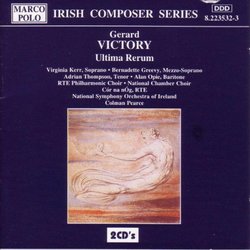| All Artists: Alan Opie, Gerard Victory, Colman Pearce, Bernadette Greevy, National Symphony Orchestra of Ireland, Virginia Kerr, Adrian Thompson Title: Victory: Ultima Rerum Members Wishing: 0 Total Copies: 0 Label: Marco Polo Release Date: 10/4/1994 Genre: Classical Styles: Opera & Classical Vocal, Chamber Music, Historical Periods, Classical (c.1770-1830) Number of Discs: 2 SwapaCD Credits: 2 UPC: 730099353229 |
Search - Alan Opie, Gerard Victory, Colman Pearce :: Victory: Ultima Rerum
 | Alan Opie, Gerard Victory, Colman Pearce Victory: Ultima Rerum Genre: Classical
|
Larger Image |
CD DetailsSimilar CDs
|
CD ReviewsMagnificent! kelsie | Plainview, Texas United States | 09/14/2006 (5 out of 5 stars) "Gerard Victory's "Ultima Rerum" is a triumphant homage to the power music has when wedded with words. The libretto to this massive oratorio, drawing on sources as diverse as the Latin Requiem Mass, Navajo Night Chant, texts from the Koran and poetry by Alfred Lord Tennyson and William Blake, to name but a small few, is a masterpiece in its own right, the excellent music it is set to aside.
Victory conceived the work as a sort of "world prayer," and in this he certainly succeeds. The piece is a tremendous and huge creation, cast into ten movements based loosely on the order of the Latin Requiem. However, there almost all similarities cease between Ultima Rerum and such Requiem collages as those by Verdi, Berlioz, or others. The Kyrie is a twelve-tone composition, while the Benedictus roars along shifting meters as the choirs sing atop one another. The Dies Irae sequence is amazing, combining the words of the traditional Latin sequence with a text by Alfred Lord Tennyson, while a sinister-sounding organ makes a number of striking appearances. The choral parts are dense and complex, and the combined choirs respond with verve and great emotion. The highlight of the work comes at its center: the Offertorium. A long, nonrhymed text, in Victory's hands the Latin Offertorium is combined with passages from the Navajo Night Chant and lengthy quotations from the Koran. The movement alternates between dancing, polyrhythmic passages for full chorus and an almost Medieval section of plainsong. The ending is a triumphant blaze of sound, with full chorus, orchestra, and four soloists putting even the Berlioz 'Te Deum' to shame! The recording is caught in vivid realism, with the sometimes-dense choral parts remaining audibly clear throughout (this is occasionally a problem in massive choral pieces, such as Mahler's 8th). The four soloists are wonderful, although the soprano occasionally sounds strained. The baritone in particular is chilling in the Dies Irae, while the tenor sounds like an angel in the Offertorium. The orchestra plays with gusto and commitment throughout. This is an easily-accessible work (well, except for the 12-tone Kyrie) for anyone wanting to venture into 20th Century choral music, and although it's a shame that a major orchestra and chorus hasn't picked it up, this pristine Marco Polo recording of Ultima Rerum is more than a bargain at such a low price!" |

 Track Listings (5) - Disc #1
Track Listings (5) - Disc #1